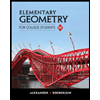14. In this exercise, we will review several basic Euclidean construc- tions with a straightedge and compass. Such constructions fasci- nated mathematicians from ancient Greece until the nineteenth cen- tury, when all classical construction problems were finally solved. (a) Given a segment AB. Construct the perpendicular bisector of AB. (Hint: Make AB a diagonal of a rhombus, as in Figure 1.23.) (b) Given a line l and a point P lying on l. Construct the line through P perpendicular to l. (Hint: Make P the midpoint of a segment of 1.) (c) Given a linel and a point P not lying on l. Construct the line through P perpendicular to l. (Hint: Construct isosceles trian- gle AABP with base AB on l and use (a).) (d) Given a line l and a point P not lying on l. Construct a line through P parallel to l. (Hint: Use (b) and (c).) (e) Construct the bisecting ray of an angle. (Hint: Use the Euclid- ean theorem that the perpendicular bisector of the base on an A B
14. In this exercise, we will review several basic Euclidean construc- tions with a straightedge and compass. Such constructions fasci- nated mathematicians from ancient Greece until the nineteenth cen- tury, when all classical construction problems were finally solved. (a) Given a segment AB. Construct the perpendicular bisector of AB. (Hint: Make AB a diagonal of a rhombus, as in Figure 1.23.) (b) Given a line l and a point P lying on l. Construct the line through P perpendicular to l. (Hint: Make P the midpoint of a segment of 1.) (c) Given a linel and a point P not lying on l. Construct the line through P perpendicular to l. (Hint: Construct isosceles trian- gle AABP with base AB on l and use (a).) (d) Given a line l and a point P not lying on l. Construct a line through P parallel to l. (Hint: Use (b) and (c).) (e) Construct the bisecting ray of an angle. (Hint: Use the Euclid- ean theorem that the perpendicular bisector of the base on an A B
Elementary Geometry For College Students, 7e
7th Edition
ISBN:9781337614085
Author:Alexander, Daniel C.; Koeberlein, Geralyn M.
Publisher:Alexander, Daniel C.; Koeberlein, Geralyn M.
ChapterP: Preliminary Concepts
SectionP.CT: Test
Problem 1CT
Related questions
Question

Transcribed Image Text:14. In this exercise, we will review several basic Euclidean construc-
tions with a straightedge and compass. Such constructions fasci-
nated mathematicians from ancient Greece until the nineteenth cen-
tury, when all classical construction problems were finally solved.
(a) Given a segment AB. Construct the perpendicular bisector of
AB. (Hint: Make AB a diagonal of a rhombus, as in Figure 1.23.)
(b) Given a line l and a point P lying on l. Construct the line through
P perpendicular to l. (Hint: Make P the midpoint of a segment
of l.)
(c) Given a line l and a point P not lying on l. Construct the line
through P perpendicular to l. (Hint: Construct isosceles trian-
gle AABP with base AB on l and use (a).)
(d) Given a line l and a point P not lying on l. Construct a line
through P parallel to l. (Hint: Use (b) and (c).)
(e) Construct the bisecting ray of an angle. (Hint: Use the Euclid-
ean theorem that the perpendicular bisector of the base on an
A
B
Expert Solution
This question has been solved!
Explore an expertly crafted, step-by-step solution for a thorough understanding of key concepts.
This is a popular solution!
Trending now
This is a popular solution!
Step by step
Solved in 3 steps with 3 images

Recommended textbooks for you

Elementary Geometry For College Students, 7e
Geometry
ISBN:
9781337614085
Author:
Alexander, Daniel C.; Koeberlein, Geralyn M.
Publisher:
Cengage,

Elementary Geometry for College Students
Geometry
ISBN:
9781285195698
Author:
Daniel C. Alexander, Geralyn M. Koeberlein
Publisher:
Cengage Learning

Elementary Geometry For College Students, 7e
Geometry
ISBN:
9781337614085
Author:
Alexander, Daniel C.; Koeberlein, Geralyn M.
Publisher:
Cengage,

Elementary Geometry for College Students
Geometry
ISBN:
9781285195698
Author:
Daniel C. Alexander, Geralyn M. Koeberlein
Publisher:
Cengage Learning